7 Reasons Mister Rogers Would be Proud of Rollins
November 19, 2019
By Stephanie Rizzo ’09
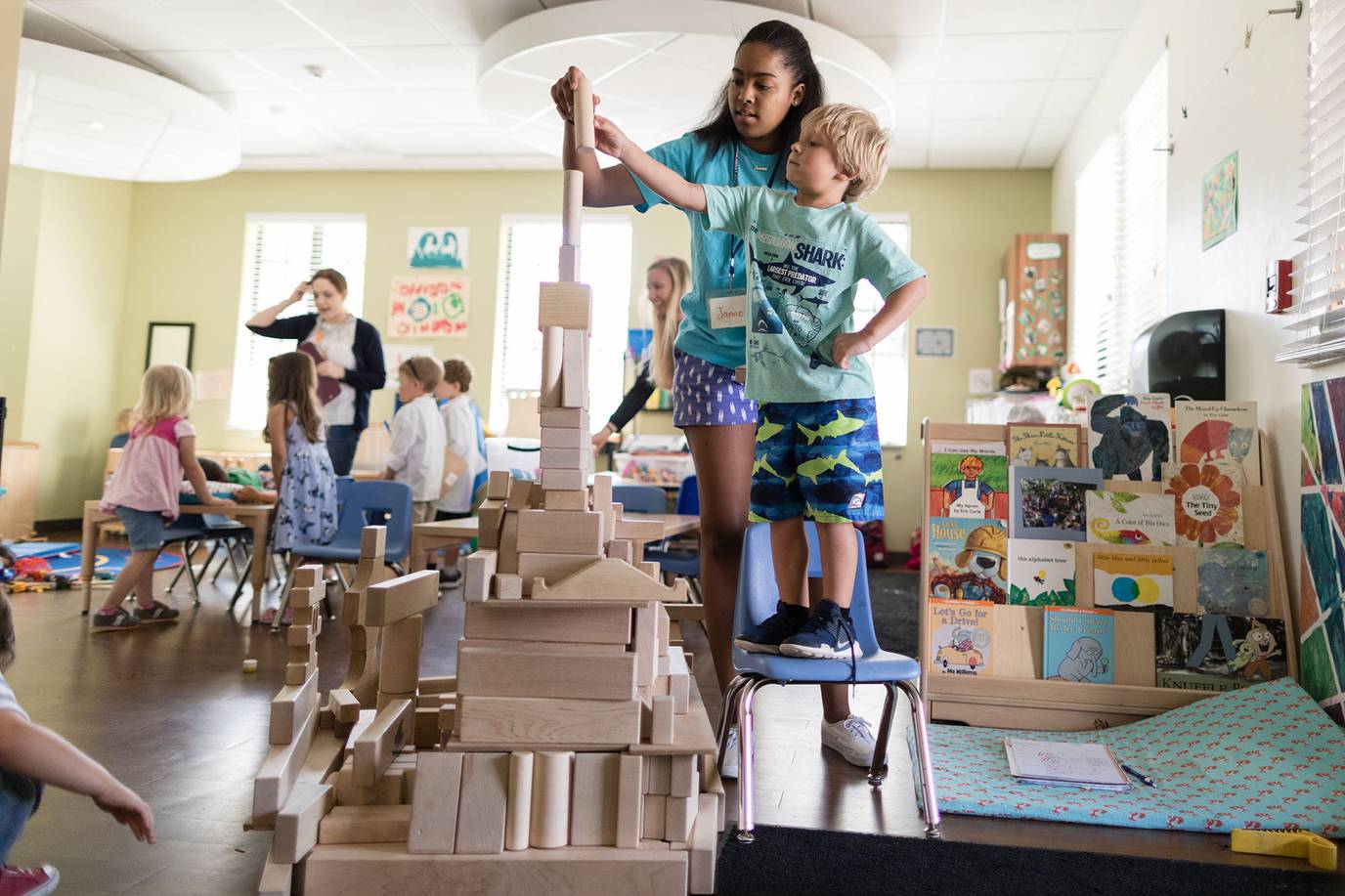
From building a better neighborhood to our focus on relational learning, explore all the ways Rollins lives out the values and ideals of its most beloved alumnus.
Nearly 70 years ago, a soft-spoken music major happened upon an engraving near Strong Hall on the Rollins campus. The motto etched into that wall, “Life is for Service,” so deeply inspired him that he carried a photo of it in his wallet for the rest of his life.
That man, of course, was Fred Rogers ’51 ’74H, friend, neighbor, and hero to children everywhere for more than 40 years. His iconic program Mister Rogers’ Neighborhood would form an enduring legacy of radical kindness that still resonates with audiences today.
In honor of that legacy, we’re looking back at some of the ways the Rollins ethos overlaps with the values Fred Rogers espoused in the way he lived his life. Here are seven ways Rollins is doing its best to make Mister Rogers proud.
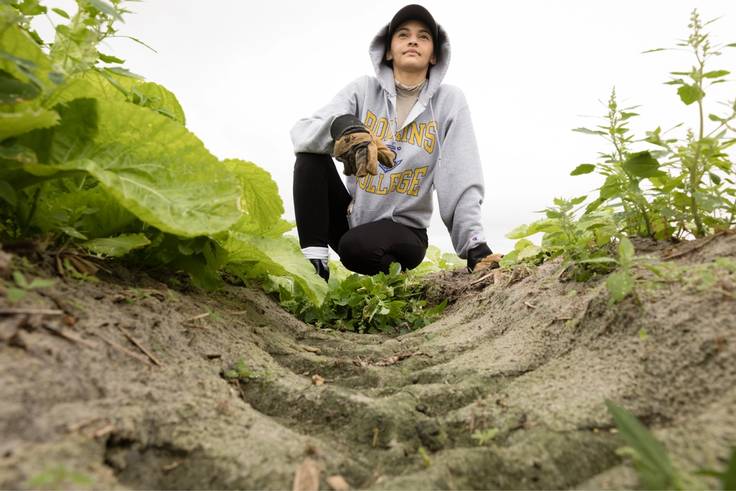
We believe life is for service.
The famous plaque in Strong Hall that inspired Fred Rogers throughout his life isn’t just a platitude—it’s embedded in the very fabric of Rollins as an institution. Service learning integrates community service and classroom instruction, creating a curriculum that focuses on problem solving and allows students to learn as they give back. From helping fourth-graders ace their math exams to ridding the Everglades of invasive species, our community engagement (CE) courses allow students to apply what they’ve learned in the classroom to real-world community service projects.
Rollins takes the idea of service learning beyond the classroom by making it a part of campus culture. It’s the driving force behind the College’s mission to create responsible leaders, and it’s evident from the moment new students set foot on campus. Over the past 14 years, nearly 10,000 Tars have contributed more than 40,000 hours of service during SPARC Day, Rollins’ annual day of service and education for all incoming first-year and transfer students.
Throughout their academic journey, Rollins students have plenty of other opportunities to engage in service learning. The Immersion program lets students, faculty, and staff spend their breaks volunteering. The Rollins Bonner Leaders Program provides the most dedicated service leaders with scholarships and training. And faculty-led field studies often focus on solving 21st-century problems.
These are just a few of the reasons why Florida Campus Compact named Rollins the Most Engaged Campus of 2018.
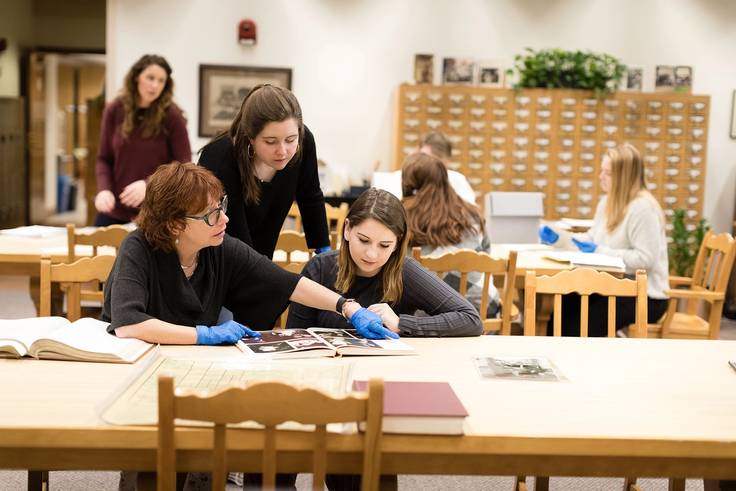
Relationships are the heart of everything we do.
Many fans of Mister Rogers’ Neighborhood recall watching the show and feeling like its host was speaking directly to them rather than to a massive television audience. Throughout his life, Rogers placed huge importance on personal relationships. Throughout Rollins’ history, we’ve placed human connections at the center of our education.
“What you will notice throughout [Fred’s] life and show is a premise that deep learning happens in the context of human relationships,” notes Rollins President Grant Cornwell in a recent issue of Rollins magazine. “It requires listening. It requires personal connection. And it requires compassion. This accurately describes the teaching and learning culture of Rollins.”
At Rollins, we believe that the best, most effective learning is both personal and hands-on. That’s why our curriculum is designed to promote engagement through action and application. You won’t find any boring lectures or overflowing auditoriums here, but you will find field studies, research opportunities, and service projects that tie back into the curriculum. You’ll find an average class size of 17 and a student-to-faculty ratio of 10:1, creating a personalized, intimate learning environment where faculty mentors and advisors help you maximize your Rollins experience and unlock your true potential.
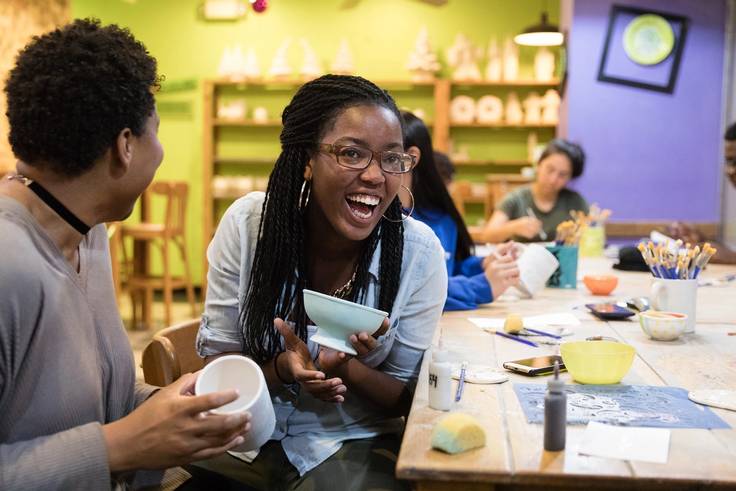
Like Mister Rogers, we’re making kindness cool.
No class rivalries here. EMBARK, a peer-orientation program that starts prior to the school year, links first-year students and transfers with third- and fourth-year Tars to help them acclimate to Rollins. The program is open to everyone but especially focuses on underrepresented populations, including students of color, those who are differently abled, and LGBTQ+ students.
That spirit of congeniality is an extension of Rollins’ focus on service learning. It’s why so many of our service projects are designed to better communities in a way that’s respectfully hands-on. Mister Rogers knew that the best way to understand someone was to listen and experience their life firsthand. Last year, Rollins student volunteers contributed more than 4,200 service hours working with more than 45 community organizations and nonprofits as part of the Immersion program. Break Away, a national nonprofit organization dedicated to promoting quality alternative break programs, recently ranked Rollins No. 1 in the nation for highest percentage of students who participate in alternative breaks.
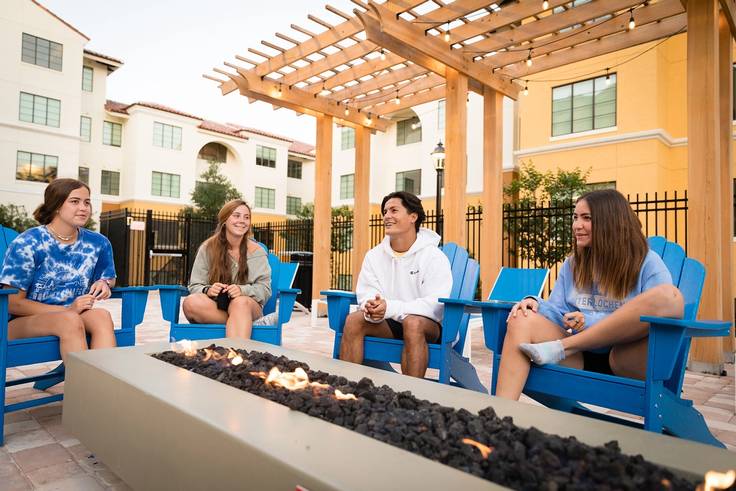
We’re building a better neighborhood.
Each week, Mister Rogers took viewers inside the Neighborhood of Make Believe, where characters formed relationships that lasted throughout the show’s 40-year run. Now, Rollins is hoping to inspire similar lifelong friendships and facilitate experiential learning through several new campus spaces.
The new Lakeside Neighborhood is taking shape along the southeastern shoreline of campus. This 250,000-square-foot residential community will center on community and is designed to support the health and well-being of its residents.
At the center of campus, a $10 million gift from Rollins Trustee Kathleen W. Rollins ’75 is powering a transformational renovation of Mills Memorial Hall. The state-of-the-art Kathleen W. Rollins Hall will bring together 10 curricular and co-curricular programs—from the Center for Career & Life Planning to the Center for Leadership & Community Engagement—in an environment that encourages community and interdisciplinary collaboration.
And the new Skillman Dining Hall located in the Cornell Campus Center offers students a central gathering place to meet, work, or just kick back and enjoy a great meal. With eight dedicated food stations and a rotating menu of seasonal dishes and comfort staples, there’s truly something for everyone.
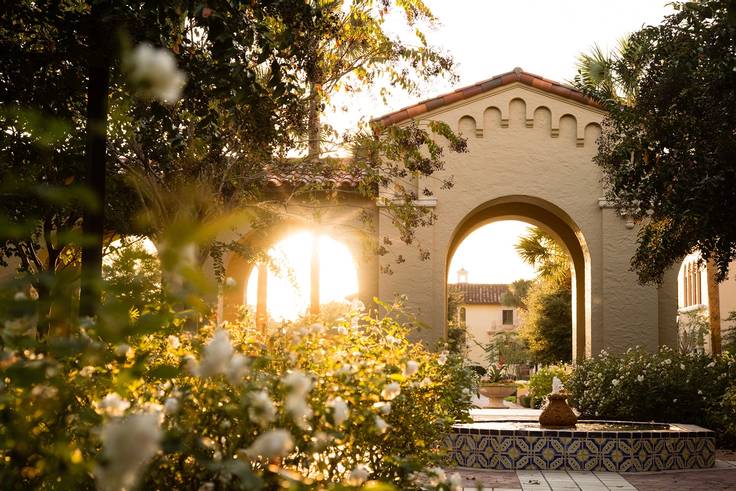
Rollins embraces silence …
Speaking to Charlie Rose in 1994, Rogers said, “I’m very concerned that our society is much more interested in information than wonder; in noise, rather than silence … how do we encourage reflection?”
Situated in the heart of picturesque Winter Park on the shores of beautiful Lake Virginia, Rollins offers plenty of room for quiet reflection. In addition to plenty of collaborative and social spaces, our 80-acre campus features some truly spectacular spots to unplug and unwind.
Our various halls are peppered with courtyards, fountains, and porches where residents can rest and recharge. Students seeking spiritual guidance can step into Knowles Memorial Chapel or join one of the many student-led organizations catering to different faiths. The Alfond Sports Center gives Tars the chance to focus on the mind-body connection, whether it’s unwinding with a yoga class, hitting the gym, or participating in intramural sports. From the serene ambience of Olin Library’s tower room to majestic sunsets by the lake, students are encouraged to embrace wonder in all its forms—both academic and otherwise.
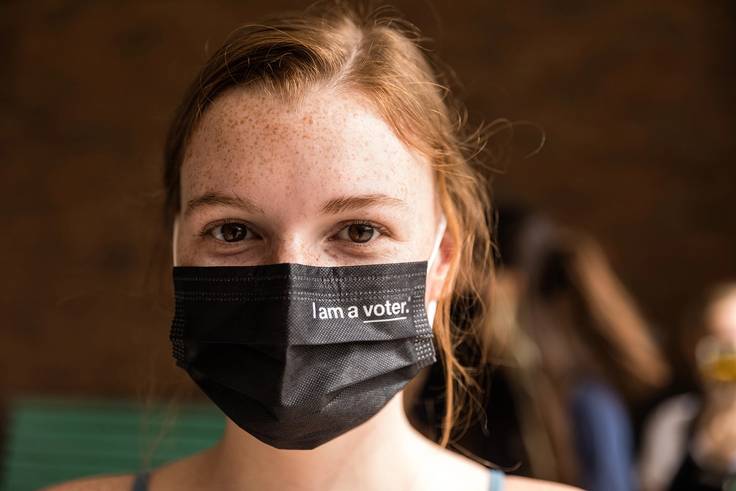
… But we know when to speak up.
In 1969, Fred Rogers appeared before the U.S. Senate Subcommittee on Communication to defend public television from budget cuts. Speaking in his trademark slow, deliberate way, he described his mission to instill confidence and kindness in a generation of kids through his work—work he hoped to continue. When all was said, the committee granted the Public Broadcasting System full funding.
In a world where public discourse is often fraught, Rollins is turning out informed, civically engaged students who know how to use their intellectual powers for good—and how to make themselves heard.
The College was recently awarded a Platinum Seal from the ALL IN Campus Democracy Challenge for its high rate of voter engagement. The voter turnout rate for Rollins during the 2018 midterm elections was 50.1 percent compared to the national average of 39.1 percent. For students looking to get more involved, the Rollins College Democracy Project is a nonpartisan student-led initiative that helps students engage in the democratic process, from organizing regular voter-registration drives to hosting debates between local candidates.
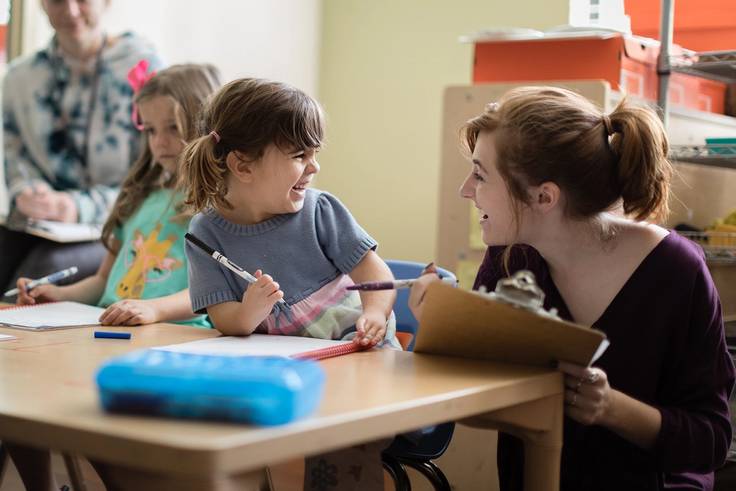
We’re investing in the next generation of students and educators.
For many, Fred Rogers was their first teacher. More than that, he inspired educators with visions of what a kinder, more compassionate classroom might look like and worked with both educators and child psychologists to bring those visions to life.
Rollins supports both pre-K students and future professionals through the Hume House Child Development & Student Research Center, a 5,050-square-foot laboratory preschool operated by the Department of Psychology. The Early Childhood Program serves children of all abilities through targeted learning—an approach that’s not all that different from how the College educates undergrads. Hands-on activities, individualized learning plans, and small group experiences are hallmarks of the program. At the same time, Hume House provides undergraduates and faculty with opportunities for research and real-world experience.
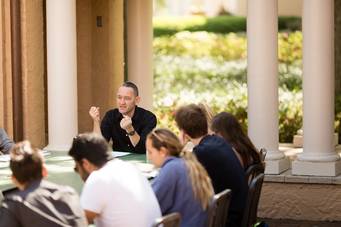
See for Yourself
Get a feel for Rollins’ unique brand of engaged learning and personalized attention through one of our virtual or in-person visit experiences.
Read More
June 27, 2024
Lahlou ’24 Earns Boren Scholarship
Adam Lahlou ’24 has earned a Boren Scholarship, a prestigious award reserved for students who intend to pursue careers in federal national security.
June 17, 2024
A Path to Purpose
Falecia Williams ’91 expanded her world by earning a Rollins degree. Now, she is working to expand the worlds of thousands of college students.
June 17, 2024
5 Ways to Share Your Light
Sharing your time, expertise, and connections with Rollins students can help fuel their career potential while strengthening your connection to your alma mater.
